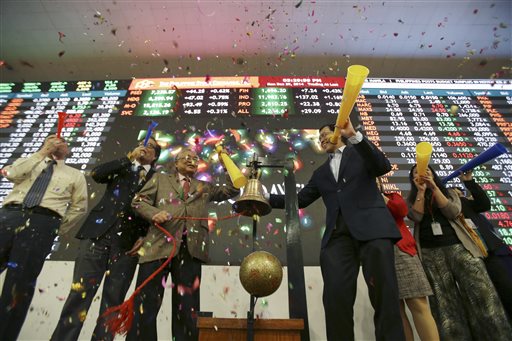
Confetti falls as Filipino traders ring the bell to close the last trading day of the year at the Philippine Stock Exchange in the financial district of Makati on Monday, Dec. 29, 2014. Asian stocks were mostly higher Monday after a report China will change banking rules in an apparent effort to boost lending and economic growth as oil prices rebounded. The Philippine Stock Exchange closed at 7,230.57, up 44.25 points, or 0.62 percent. AP PHOTO/AARON FAVILA
HONG KONG–Asian markets mostly rose Monday on the first full day of trade after the Christmas break, with confidence boosted by Chinese easing measures and another Wall Street record.
Shares in AirAsia tumbled after one of the budget carrier’s jets went missing with 162 people on board Sunday.
Hong Kong rallied 1.82 percent, or 423.84 points, to 23,773.18 and Shanghai added 0.33 percent, or 10.42 points, to 3,168.02.
Sydney finished up 1.47 percent, or 79.3 points, at 5,473.8.
But Tokyo ended 0.50 percent lower, giving up morning gains as the yen ticked up against the dollar. The Nikkei slipped 89.12 points to 17,729.84.
Seoul shed 1.04 percent, or 20.30 points, to end at 1,927.86.
With most bourses closed at the end of last week, Monday was the first time dealers could react to the positive news out of the United States and China.
On Wall Street Friday the Dow notched its seventh straight gain, advancing 0.13 percent to another record, while the S&P 500 jumped 0.33 percent, also a hitting an all-time high following news that the US economy grew five percent in July-September. The Nasdaq gained 0.70 percent.
The growth rate was the best in 11 years and is yet another indicator showing the world’s No. 1 economy is well on the recovery track.
It will also add to calls for the Federal Reserve to raise interest rates next year, boosting the dollar against the yen, although the Japanese unit recovered on Monday.
AirAsia hit by sell-off
In afternoon Tokyo trade the greenback was at 120.33 yen, compared with 120.37 in New York Friday. The dollar had touched 120.60 yen earlier Monday before profit-takers moved in.
The euro bought $1.2177 and 146.56 yen, against $1.2179 and 146.59 yen.
Adding to buying confidence was news that China’s State Council late Wednesday announced preferential policies for manufacturers, including a promise to extend financial support, especially to large-scale equipment makers, to expand their exports.
The move is the latest by Beijing to kickstart the Chinese economy, which has been hit by a series of weak data, including on exports, manufacturing, consumer spending and investment.
Kuala Lumpur-listed shares in AirAsia shed 12 percent at one point on news that the plane from its Indonesian affiliate went down in the Java Sea Sunday morning.
They recovered slightly to be down 8.50 percent at the close.
Oil prices rose after fresh violence erupted in Libya. US benchmark West Texas Intermediate for February delivery gained 61 cents to $55.34 while Brent crude for February was up 48 cents to $59.93.
Forces loyal to Libya’s internationally recognized government on Sunday carried out air strikes against Islamist militias following attacks on the crucial Al-Sidra oil export terminal.
The Fajr Libya group has been been trying to take Al-Sidra and the nearby Ras Lanuf terminal since Thursday.
Seven oil storage tanks at Al-Sidra were set on fire as a result of the fighting.
Since fresh clashes erupted around the export terminals on Dec. 13, Libya’s oil production has dropped to fewer than 350,000 barrels per day compared with 800,000 previously, industry experts say.
Gold was at $1,193.84 an ounce, compared with $1,196.96 Friday.
In other markets:
— Taipei rose 0.74 percent, or 67.78 points, to 9,286.28.
Taiwan Semiconductor Manufacturing Co. gained 1.81 percent to Tw$141.0, while Hon Hai Precision Industry closed 0.68 percent lower at Tw$87.8.
— Wellington added 0.63 percent, or 34.91 points, to 5,592.33.
— Manila closed up 0.62 percent, or 44.25 points, at 7,230.57.
Universal Robina gained 1.29 percent to 2.50 pesos but Philippine Long Distance Telephone dipped 0.07 percent to 2,906 pesos.
— Bangkok fell 0.81 percent, or 12.19 points, to 1,498.22.
Media operator BEC World fell 3.85 percent to 50 baht, while oil company PTT lost 1.21 percent to 326 baht.
— Mumbai rose 0.57 percent, or 153.95 points, to 27,395.73 points.
Sesa Sterlite rose 3.81 percent to 215.30 rupees, while telecom major Bharati Airtel fell 0.80 percent to 351.60 rupees.
— Jakarta ended up 0.22 percent, or 11.39 points, at 5,178.37.
Retailers Ramayana Lestari Sentosa gained 5.48 percent to 770 rupiah, while lender Bank Negara Indonesia slipped 0.81 percent to 6,100 rupiah.
— Singapore closed up 0.42 percent, or 14.01 points, to 3,367.69.
DBS Bank gained 1.03 percent to Sg$20.56 while oil rig maker Keppel Corp. rose 1.14 percent to Sg$8.85.
— Kuala Lumpur gained 0.23 percent, or 3.97 points, to 1,768.41.

